All materials in these studies that are not otherwise attributed are © 2014 by Tool Box for Faith. Expressed permission is hereby granted to download and print these materials for personal/congregational use only. If you wish to use any of these materials for any other groups or other purposes, please contact us (gennowdisciples@gmail.com) for permission. In all cases, include this copyright notice and email address with any versions of the material. Thank you.
Section 1: Opening Prayer
O God, full of compassion, we commit and commend ourselves to you, in whom we live and move and have our being. Be the goal of our pilgrimage, and our rest by the way. Give us refuge from the turmoil of worldly distractions beneath the shadow of your wings. Let our hearts, so often a sea of restless waves, find peace in you, O God; through Jesus Christ our Lord. Amen.
Section 2: The Christian Family
As Lutherans, we claim a Christian identity. Maybe the easiest way to say it is this: all Lutherans are Christian, but not all Christians are Lutheran.
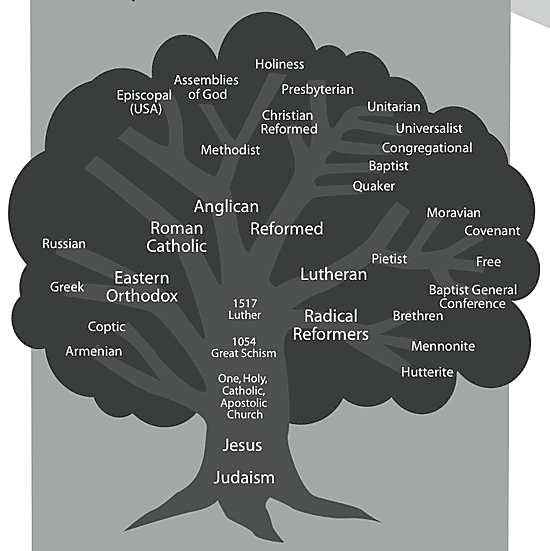
In other words, there’s a number of other sisters and brothers out there who share our faith but don’t share some of our particular or unique beliefs. If you remember the “Being Lutheran” lesson, what separates us for the most part is adiaphora, or beliefs that may make us unique but aren’t necessary for salvation.
You likely know many of these people. Catholic and Methodist, Presbyterian and Baptist, Orthodox and Assembly of God, Nondenominational and Pentecostal, we’re all part of the larger body that makes us Christians.
There’s even different Lutheran denominations! We’re members of the Evangelical Lutheran Church in America, but there’s many others. This chart shows some of the history of our development.
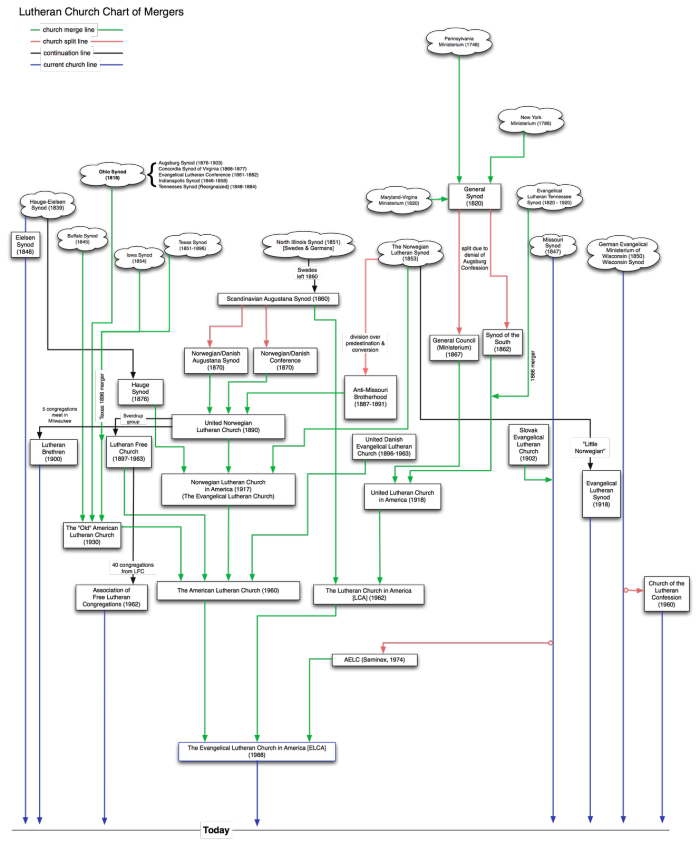
So, if there’s other Christians, and even other Lutherans, what is it that binds us together in the one family of faith?
Section 3: Identifying The Family Tree
There’s another way to ask this question. What do we mean by Christian? Here’s where things get funky. A number of factors can contribute to an understanding of Christian identity. Before we move on, though, share at least one thing that you think is necessary for the Christian faith.
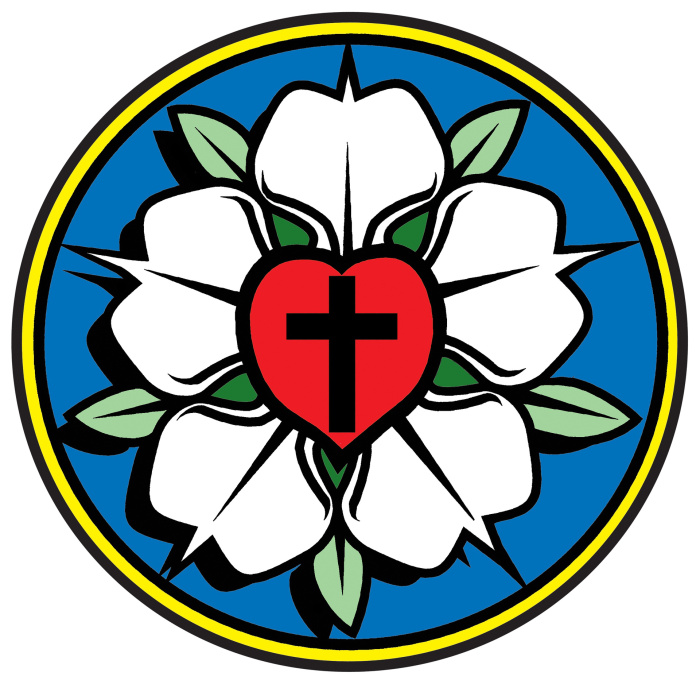
Who Says They’re Christian – The most basic way we can think about other Christians is who says they’re Christian. Not all people that value Jesus claim to be Christian. Muslims believe Jesus was a prophet of the One True God, but wouldn’t call themselves Christians. Gandhi deeply valued Jesus’ teachings, but didn’t say he was a Christian (he claimed Hinduism as his religion). In other words, not everyone who values Jesus considers themselves a Christian.
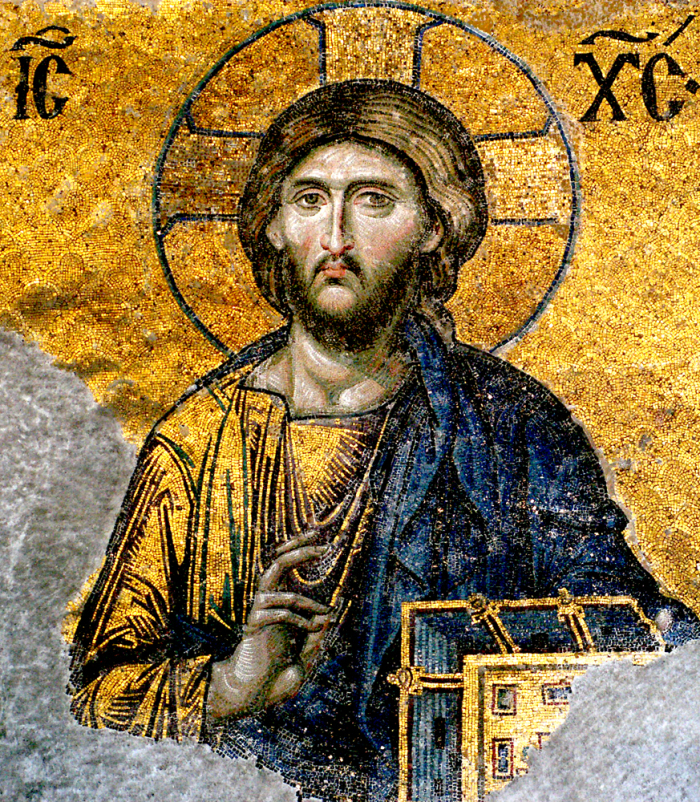
Who Claims Jesus as God – This is a general approach that helps to identify what we mean by Christian. In general, all the denominations in our Christian family tree claim Jesus as fully human and fully God.
However, there are some subtle but important differences in some denominations. There are some people like Jehovah’s Witnesses who believe Jesus offers us salvation, but that Jesus is not God and therefore shouldn’t be worshiped. That’s goes against the common claim shared by most churches that Jesus is God, which most denominations consider a necessary belief. In other words, even considering Jesus necessary for salvation doesn’t make someone a Christian in the understanding of Lutherans or most churches.
Who Believes in the Triune God – One of the most common threads for Christians is our belief that God is three persons – Father, Son, and Holy Spirit – but one God. That’s why each of our creeds has three stanzas that
address the work of each person of the Trinity. The graphic to the right shows one way to conceive of the Trinity. Most churches consider a baptism in any church valid, so long as it was done in the name of the Father, the Son, and the Holy Spirit.
Yet, even here there’s differences. Throughout church history, many Christians believed, for instance, that God was only one person who work different masks or appeared in different ways. Others said that Jesus and the Holy Spirit were God, but in different ways than the Father was God. These and all sorts of other beliefs were called heresies, or false beliefs. But the people who held to them still considered themselves Christian!
+ BUT THERE’S SOMETHING MORE +
You see, in his Preface to the Small Catechism, Martin Luther expresses his frustration that people, even though they claimed to be Christians and even shared the right beliefs, didn’t fully embrace the Christian faith. He encouraged Christians to focus on two things in particular to help us grow in our Christian identity.
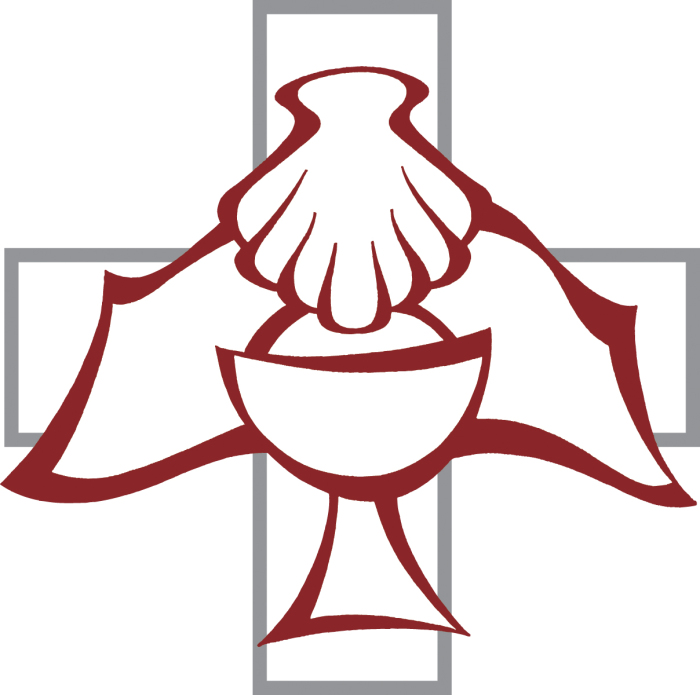
Participate in the Sacraments – One of the things that all Christians do in some way is participate in the sacraments. Of course, some denominations have more sacraments (Catholic, Orthodox, and Episcopalian churches practice seven sacraments), while other denominations don’t call them sacraments (for instance, the Brethren communities typically prefer the term “ordinances” to sacraments). We even believe different things about the sacraments (Lutherans believe God is actively present in the water, bread, and wine, while Baptists believe they’re our outward signs of inward changes). But, most every Christian denomination practices Baptism and Communion as a part of our worship.
No matter our theology, in the sacraments we’re bound to God’s work in the past, tied to the present work of God through the church, and set forth on a trajectory for God’s future. The sacraments, practiced within the worship of God’s people, act as a sign across denominations that we’re all Christians, despite our differences in belief and practice.

Live Like Jesus – Alongside our beliefs and rituals come our actions. In the Catechism, Luther talks about our ethics. One simple way to think about this is that all Christians are called to live like Jesus, to change our behaviors to match the way that Jesus lived. The “What Would Jesus Do” movement tries to capture this sentiment, that our identity as Christians, as people of Christ, is tied to our behavior and how much that matches Jesus’ own actions. We even say this every time we pray the Lord’s Prayer, where we ask God to forgive us our trespasses with the same forgiveness that we offer to others, where we ask God to lead us not into our temptations but to deliver us from the evil that we face. Christians are those who not just say they’re Christians, or believe the right things about God, or perform the right rituals, but who live like Jesus too.
Section 4: WHO CAN DO THAT!?!?!?!?!
When we talk about other Christians, sometimes we feel like we’re put into this place of evaluation. Who is and isn’t a Christian? As Lutherans, though, a few things can guide us in this conversation to offer a faithful, compassionate response.

First, remember that we’re simultaneously sinners and saints. As we think about other Christians, we must remember that no one is perfect! Someone may live like Jesus but have beliefs that contradict most other Christians. Another may have beliefs totally consistent with most other Christians but struggle to look anything like Jesus in their daily lives. Are both still Christians?
Secondly, in his discussion of the 10 Commandments, Luther reminded us to always look at our neighbors through a constructive and charitable lens. In other words, we should look at other Christians with Jesus-colored glasses on. When we talk about other Christians, the goal shouldn’t be to decide who’s in our out. In fact, Jesus told parables about wheat and weeds, as well as prophecies about sheep and goats, all of which reminded us that it’s not our job to judge who’s in or out. That’s up to God.
So, what should our goal with other Christians be? Proverbs 27:17 helps us out with this as it says, “As iron sharpens iron, so one person hones the wits of another.” More simply, we make one another better when we work together to look, love, and live more like Jesus! So, rather than try to decide who is in or out, we instead work alongside those who identify themselves as Christians so that we all become more like Christ.
Other denominations bring us great gifts in faith. Orthodox iconography contributes not just art, but helps to guide our worship. Methodist hymns help us to sing our faith, like Wesley’s “Lift High the Cross” highlights our Easter joy. Pentecostal worship keeps us connected with our emotions, and Catholic ritual reminds us of how routine shapes us into Christ’s image. The differences we bring often highlight the beauty of the church and help us each to appreciate the different ways God enables us to grow in our faith.
Other Christians are a gift, even when we don’t agree with them. Sometimes these differences can help us to see our growing edges, to see places where we might need change. At other times, the differences can highlight how we appreciate our own traditions. As we look to other Christians, our goal ought to finally be not to judge against one another, but to work together so that more and more people might come to know the love, the care, and the joy of Jesus.
Share something from another church that you like or appreciate, and share something that challenges you. Then, ask yourself, how might other Christians help me to grow in my own faith? How might I as a Lutheran help others to grow in their faith? Reflect on these things and write down some answers as you listen to this song about our mission together as the Body of Christ.
Section 5: Closing Prayer
Almighty God, you have built your church upon the foundation of apostles and prophets, with Christ Jesus himself as the cornerstone. Grant that the people of this congregation may be joined together as a holy temple, a place where you dwell. Send your Holy Spirit upon us that, guided by your word and strengthened by your sacraments, we may plan and do things that will be for the good of your church and the glory of your name; through Jesus Christ, our Savior and Lord. Amen.
Opening and Closing Prayers from Sundays and Seasons.com. Copyright 2015 Augsburg Fortress. All rights reserved. Reprinted by permission under Augsburg Fortress Liturgies Annual License #25165.